John Calvin
John Calvin (10 July 1509 – 27 May 1564) was a French theologian, pastor and reformer in Geneva during the Protestant Reformation. He was a principal figure in the development of the system of Christian theology later called Calvinism, including its doctrines of predestination and of God's absolute sovereignty in the salvation of the human soul from death and eternal damnation. Calvinist doctrines were influenced by and elaborated upon the Augustinian and other Christian traditions. Various Congregational, Reformed and Presbyterian churches, which look to Calvin as the chief expositor of their beliefs, have spread throughout the world.
Is there room for mysticism inside the Presbyterian Church (U.S.A.)?
John Calvin was a French theologian who lived and wrote much of his doctrine from Geneva, Switzerland. He wished to join the priesthood, but at the urging of his father, went to law school instead. Afterwards, he traveled to Paris where he encountered Martin Luther’s radical theological ideas. While there, he wrote Institutes of the Christian Religion. Calvin did not set out to reform the church but became involved when the city of Geneva, which had recently evicted the priests loyal to Rome, asked him for help. Reformer William Farel pleaded for Calvin to stay, and when Calvin initially declined, Farel informed him that the request came from God. Filled with awe and fear, Calvin accepted the position. Calvin believed that the Catholic Church had strayed from and distorted the Biblical tradition. Calvin saw the church as having two functions: “preaching the Biblical word and administering the sacraments,” Feldmeier writes. Faith was public, and Scriptures, although subject to interpretation, held the possibility of an authentic revelation. Calvin believed in Christ’s real presence in the Eucharist and, in sharp contrast to Vatican doctrine, that the church was a democratic institution. He advocated for the priesthood of believers. Other aspects of Calvin’s theology were more restrictive, such as in his limitations on dancing and his notions of predestination................In Institutes of the Christian Religion, Calvin writes about this union in several different ways. For example, “Christ is not external to us, but dwells in us; and not only unites us to himself by an undivided bond of fellowship, but by a wondrous communion brings us daily into closer connection, until he becomes altogether one with us.” Calvin does not define exactly what this union looks like, and only provides examples of times when unity with Christ exists. Calvin connects union with piety, writing “By piety I mean that union of reverence and love to God which the knowledge of his benefits inspires.” Tamburello argues that Calvin was ultimately interested in “promoting a relationship with the living God” and not just intellectual speculation. Calvin’s understanding of the sacraments shed more light on his notions of unity. Baptism for Calvin is “the initiatory sign by which we are admitted to the fellowship of the Church, that being engrafted into Christ we may be accounted children of God.” Tamburello argues that Calvin’s three signs of true membership in the church – union with Christ through profession of faith, participation in the sacraments and leading of a moral life – are examples of “ordinary mysticism” that is “an experience of intimacy with God in
and through everyday piety and Christian living.”
(Lydia Griffiths/Presbyterian Outlook 12/7/23)
READ MORE>>>>>
John Calvin was a French theologian who lived and wrote much of his doctrine from Geneva, Switzerland. He wished to join the priesthood, but at the urging of his father, went to law school instead. Afterwards, he traveled to Paris where he encountered Martin Luther’s radical theological ideas. While there, he wrote Institutes of the Christian Religion. Calvin did not set out to reform the church but became involved when the city of Geneva, which had recently evicted the priests loyal to Rome, asked him for help. Reformer William Farel pleaded for Calvin to stay, and when Calvin initially declined, Farel informed him that the request came from God. Filled with awe and fear, Calvin accepted the position. Calvin believed that the Catholic Church had strayed from and distorted the Biblical tradition. Calvin saw the church as having two functions: “preaching the Biblical word and administering the sacraments,” Feldmeier writes. Faith was public, and Scriptures, although subject to interpretation, held the possibility of an authentic revelation. Calvin believed in Christ’s real presence in the Eucharist and, in sharp contrast to Vatican doctrine, that the church was a democratic institution. He advocated for the priesthood of believers. Other aspects of Calvin’s theology were more restrictive, such as in his limitations on dancing and his notions of predestination................In Institutes of the Christian Religion, Calvin writes about this union in several different ways. For example, “Christ is not external to us, but dwells in us; and not only unites us to himself by an undivided bond of fellowship, but by a wondrous communion brings us daily into closer connection, until he becomes altogether one with us.” Calvin does not define exactly what this union looks like, and only provides examples of times when unity with Christ exists. Calvin connects union with piety, writing “By piety I mean that union of reverence and love to God which the knowledge of his benefits inspires.” Tamburello argues that Calvin was ultimately interested in “promoting a relationship with the living God” and not just intellectual speculation. Calvin’s understanding of the sacraments shed more light on his notions of unity. Baptism for Calvin is “the initiatory sign by which we are admitted to the fellowship of the Church, that being engrafted into Christ we may be accounted children of God.” Tamburello argues that Calvin’s three signs of true membership in the church – union with Christ through profession of faith, participation in the sacraments and leading of a moral life – are examples of “ordinary mysticism” that is “an experience of intimacy with God in
and through everyday piety and Christian living.”
(Lydia Griffiths/Presbyterian Outlook 12/7/23)
READ MORE>>>>>
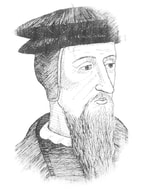 John Calvin Files
John Calvin Files
The philosophers postulate four kinds of causes to be observed in the outworking of things. If we look at these, however, we will find that, as far as the establishment of our salvation is concerned, none of them has anything to do with works. For Scripture everywhere proclaims that the efficient cause of our obtaining eternal life is the mercy of the Heavenly Father and his freely given love toward us. Surely the material cause is Christ, with his obedience, through which he acquired righteousness for us. What shall we say is the formal or instrumental cause but faith? And John includes these three in one sentence when he says: “God so loved the world that he gave his only-begotten Son that everyone who believes in him may not perish but have eternal life” [John 3:16]. As for the final cause, the apostle testifies that it consists both in the proof of divine justice and in the praise of God’s goodness, and in the same place he expressly mentions three others. --John Calvin, Institutes
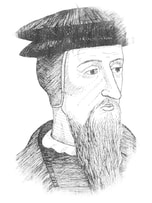 John Calvin Files
John Calvin Files
”Seeing that this brutish stupidity has overspread the globe, men longing after visible forms of God, and so forming deities of wood and stone, silver and gold, or of any other dead and corruptible matter, we must hold it as a first principle, that as often as any form is assigned to God, his glory is corrupted by an impious lie. In the Law, accordingly, after God had claimed the glory of divinity for himself alone, when he comes to show what kind of worship he approves and rejects, he immediately adds, “Thou shalt not make unto thee any graven image, or any likeness of anything that is in heaven above, or in the earth beneath, or in the water under the earth,” (Exod. 20:4). By these words he curbs any licentious attempt we might make to represent him by a visible shape, and briefly enumerates all the forms by which superstition had begun, even long before, to turn his truth into a lie.” --John Calvin, Institutes Book 1, Ch. 11, Sect. 1
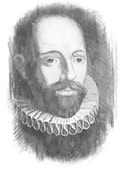 Jacobus Arminius
Jacobus Arminius
“Next to the study of the Scriptures which I earnestly inculcate, I exhort my pupils to peruse Calvin’s Commentaries, which I extol in loftier terms than Helmich himself [a Dutch divine, 1551–1608]; for I affirm that he excels beyond comparison in the interpretation of Scripture, and that his commentaries ought to be more highly valued than all that is handed down to us by the library of the fathers; so that I acknowledge him to have possessed above most others, or rather above all other men, what may be called an eminent spirit of prophecy” ― Jacobus Arminius
Nov 11, 2022: Christian Institute: All for the glory of God
We can do all for the glory of God. As John Calvin (1509-1564) said: “there is no part of our life or conduct, however insignificant which should not be related to the glory of God”.
Those working in the home or in public service, the arts or in business can be just as pleasing to God as those working for the Church, strategic though church work is.
We can do all for the glory of God. As John Calvin (1509-1564) said: “there is no part of our life or conduct, however insignificant which should not be related to the glory of God”.
Those working in the home or in public service, the arts or in business can be just as pleasing to God as those working for the Church, strategic though church work is.
Sept 2, 2022: Michael AG Haykin: Desiring God: A Meal for the Journey
John Calvin (1509–1564), who stands at the fountainhead of the tradition of which Staveley was a part, was quite content to leave it as a mystery as to how the emblems of bread and wine are employed by the Holy Spirit to make Christ present at the celebration of his Supper. And roughly down until the opening of the nineteenth century, anglophone evangelicals followed in his stead, treasuring the presence of Christ at the Table without feeling pressured to explain exactly how this worked.
John Calvin (1509–1564), who stands at the fountainhead of the tradition of which Staveley was a part, was quite content to leave it as a mystery as to how the emblems of bread and wine are employed by the Holy Spirit to make Christ present at the celebration of his Supper. And roughly down until the opening of the nineteenth century, anglophone evangelicals followed in his stead, treasuring the presence of Christ at the Table without feeling pressured to explain exactly how this worked.
Nov 30, 2021: Credo: What made Calvin a theologian and a pastor? Matthew Barrett and Bruce Gordon
John Calvin was an influential figure of the Reformation, but have you ever considered some of the events, enemies, friendships, relationships, and influences that shaped Calvin, as well as monumental works such as his Institutes and biblical commentaries? What inspired Calvin to write these works and what was the context in which they came to life?
John Calvin was an influential figure of the Reformation, but have you ever considered some of the events, enemies, friendships, relationships, and influences that shaped Calvin, as well as monumental works such as his Institutes and biblical commentaries? What inspired Calvin to write these works and what was the context in which they came to life?
Jan 11, 2022: Southern Equip: “The Word Did It All”: The Necessity of reaching According to the Protestant Reformers
Calvin agreed with Luther the pioneer. He described justification by faith alone as “the main hinge on which religion turns.” And the means of proclaiming this exquisite gospel is the ordinary preaching of the Word of God. Calvin counted it “a singular privilege” that God had consecrated “to himself the mouths and tongues of men in order that his voice may resound in them.” Preaching is essential. In fact, nothing is “more notable or glorious in the church than the ministry of the gospel, since it is the administration of the Spirit and of righteousness and of eternal life.”
Calvin agreed with Luther the pioneer. He described justification by faith alone as “the main hinge on which religion turns.” And the means of proclaiming this exquisite gospel is the ordinary preaching of the Word of God. Calvin counted it “a singular privilege” that God had consecrated “to himself the mouths and tongues of men in order that his voice may resound in them.” Preaching is essential. In fact, nothing is “more notable or glorious in the church than the ministry of the gospel, since it is the administration of the Spirit and of righteousness and of eternal life.”
March 10, 2010:
Inerrancy of Scripture
The Reformers similarly affirmed the truthfulness of the Bible. There is some debate among scholars whether Luther and Calvin limited Scripture’s truthfulness to matters of salvation, conveniently overlooking errors about lesser matters. It is true that Luther and Calvin are aware of apparent discrepancies in Scripture and that they often speak of “errors.” However, a closer analysis seems to indicate that the discrepancies and errors are consistently attributed to copyists and translators, not to the human authors of Scripture, much less to the Holy Spirit, its divine author. Calvin was aware that Paul’s quotations of the Old Testament (e.g., Romans 10:6 and Deuteronomy 30:12) were not always exact, nor always exegetically sound, but he did not infer that Paul had thereby made an error. On the contrary, Calvin notes that Paul is not giving the words of Moses different sense so much as applying them to his treatment of the subject at hand. Indeed, Calvin explicitly denies the suggestion that Paul distorts Moses’ words. (Kevin J. Vanhoozeron; CS Lewis Insttute)
Read More>>>>>
The Reformers similarly affirmed the truthfulness of the Bible. There is some debate among scholars whether Luther and Calvin limited Scripture’s truthfulness to matters of salvation, conveniently overlooking errors about lesser matters. It is true that Luther and Calvin are aware of apparent discrepancies in Scripture and that they often speak of “errors.” However, a closer analysis seems to indicate that the discrepancies and errors are consistently attributed to copyists and translators, not to the human authors of Scripture, much less to the Holy Spirit, its divine author. Calvin was aware that Paul’s quotations of the Old Testament (e.g., Romans 10:6 and Deuteronomy 30:12) were not always exact, nor always exegetically sound, but he did not infer that Paul had thereby made an error. On the contrary, Calvin notes that Paul is not giving the words of Moses different sense so much as applying them to his treatment of the subject at hand. Indeed, Calvin explicitly denies the suggestion that Paul distorts Moses’ words. (Kevin J. Vanhoozeron; CS Lewis Insttute)
Read More>>>>>
Calvinism is just religion in its purity. We have only, therefore, to conceive of religion in its purity, and that is Calvinism. — BB Warfield; Selected Shorter Writings, vol. I, p. 389.
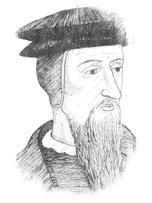 John Calvin Files
John Calvin Files
"The voice of man is nothing but a sound that vanishes in the air, and notwithstanding it is the power of God to salvation to all believers (saith Saint Paul). When then God speaketh unto us, by the mouth of men, then he adjoins the inward grace of his Holy Spirit, to the end, that the doctrine be not unprofitable, but that it may bring forth fruit. See then how we hear the heavenly Father: that is to say, when he speaketh secretly unto us by his Holy Spirit, and then we come unto our Lord Jesus Christ.
-John Calvin, third sermon on Jacob and Esau, quoted in Leith, “Calvin’s Doctrine of the Proclamation of the Word"
-John Calvin, third sermon on Jacob and Esau, quoted in Leith, “Calvin’s Doctrine of the Proclamation of the Word"
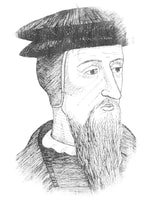 John Calvin Files
John Calvin Files
"This seems to me a confirmation of the last clause. For he had said, that they sent forth their boughs or east them forth, but yet to their destruction. He now repeats the same thing in other words. Therefore I will also act in, my turn — that is, as they now boldly increase their superstitions, and so continually provoke me, at length I will act, says he. There is a tacit contrast, since God forsooth had ceased for a long time, because there is a certain form of rest when he ceases from his judgments: God seems to rest when he does not take vengeance on man’s wickedness, when he indulges them and passes them by for a time. Since, therefore, he had so suspended his judgments against the Jews, he seemed to cultivate ease in heaven: with this view he says, that he would do it in his anger, and he adds, that his vengeance would be so dreadful that there would be no place for pity. This ought indeed to strike us when God pronounces himself implacable. For what is more formidable than to have God hostile, and to be verily without any hope of pardon? As often as God withdraws his mercy he shows us material for trembling, nor is it wonderful that he threatened the Jews so harshly, because he had proved by all methods that they were desperate in their wickedness. For truly nothing had been omitted towards curing them, unless they had been of an abandoned disposition and of most obstinate manners. Since, therefore, they were such, it is not surprising that God was extremely enraged against them, so that he left them no hope of pardon. But this ought to be referred generally to the whole body of the people: meanwhile it is by no means doubtful, as we shall afterwards see, that God excepts his elect from the ordinary multitude. If any one object, that God always hears prayers, I reply that he never rejects prayers which spring from faith: but here that tumultuous clamor is alluded to which necessity occasions to unbelievers. For although they fly to God as their natural sense impels them, yet they do not this with composed minds, nor even relying upon the promises of God: but because the torture of their minds does not suffer them to rest, so that by a natural impulse they are carried to God and cry to him without any faith or sincere affection. He speaks, therefore, concerning that kind of ejaculation which is described to us in the case of Esau, and hence he says with a loud voice, (Genesis 27:34; Psalm 3:4; Psalm 22:2; and Psalm 32:3, and elsewhere often.) Although the faithful also raise their voice: nay even cry out loudly, as David testifies of himself, yet it is peculiar to the incredulous to utter their clamor with full cheeks though the mind is void of faith, and is even obstinate in its wickedness. Hence they do not open the heart when they thus cry to God. Hence it is not wonderful if God rejects them and is deaf to their complaints. Now it follows." --John Calvin
| “When he was thrown into a stable, and placed in a manger, and a lodging refused him among men, it was that heaven might be opened to us, not as a temporary lodging, but as our eternal country and inheritance, and that angels might receive us into their abode.”
|
| "Imitators of me. From this it appears, how absurdly chapters are divided, inasmuch as this sentence is disjoined from what goes before, with which it ought to have been connected, and is joined to what follows, with which it has no connection. Let us view this, then, as the close of the preceding chapter. Paul had there brought forward his own example in confirmation of his doctrine. Now, in order that the Corinthians may understand that this would be becoming in them, he exhorts them to imitate what he had done, even as he had imitated Christ Here there are two things to be observed — first, that he prescribes nothing to others that he had not first practiced himself; and, secondly, that he directs himself and others to Christ as the only pattern of right acting. For while it is the part of a good teacher to enjoin nothing in words but what he is prepared to practice in action, he must not, at the same time, be so austere, as straightway to require from others everything that he does himself, as is the manner of the superstitious. For everything that they contract a liking for they impose also upon others, and would have their own example to be held absolutely as a rule. The world is also, of its own accord, inclined to a misdirected imitation, (κακοζηλίαν) and, after the manner of apes, strive to copy whatever they see done by persons of great influence. We see, however how many evils have been introduced into the Church by this absurd desire of imitating all the actions of the saints, without exception. Let us, therefore, maintain so much the more carefully this doctrine of Paul — that we are to follow men, provided they take Christ as their grand model, (πρωτότυπον,) that the examples of the saints may not tend to lead us away from Christ, but rather to direct us to him. " |
| If a reason is given here why the Prophet had bidden the heavens to be astonished and terrified, then we must render the words thus, “For two evils have my people done:” but I rather think that the preceding verse is connected with the former verses. The Prophet had said, “Go to the farthest lands, and see whether any nation has changed its gods, while yet they are mere inventions.” I think then the subject is closed with the exclamation in the preceding verse, when the Prophet says, “Be astonished, ye heavens.” It then follows, “Surely, two evils have my people done,” even these, — “they have forsaken me,” — and then, “they sought for themselves false gods.” When any one forsakes an old friend and connects himself with a new one, it is an iniquitous and a base conduct: but when there is no compensation, there is in it united together, folly, levity, and madness. If I despise what I know to be profitable to me, and embrace what I understand will be to my hurt, does not such a choice prove madness? This then is what the Prophet now means, when he says, that the people had sinned not only by departing from the true God, but also by going over, without any compensation, unto idols, which could confer no good on them. He says that they had done two evils: the first was, they had forsaken God; and the other, they had fallen away unto false and imaginary gods. But the more to amplify their sin, he makes use of a similitude, and says that God is a fountain of living waters; and he compares idols to perforated or broken cisterns, which hold no water When one leaves a living fountain and seeks a cistern, it is a proof of great folly; for cisterns are dry except water comes elsewhere; but a fountain has its own spring; and further, where there is a vein perpetually flowing, and a perennial stream of waters, the water is more salubrious and much better. The waters which rain brings into cisterns are never so wholesome as those which flow from their own native vein: and when the very receptacles of water are full of chinks, what must they be but empty? Hence then God charges the people with madness, because he was forsaken, who was a fountain and a fountain of living waters; and further, because the people sought unprofitable things when they went after their idols. For what is to be found in idols? some likeness; for the superstitious think that they labor not in vain, when they worship false gods, and they hope to derive some benefit. There are then some resemblances to the true in false religions; and hence the Prophet compares false gods to wells, because they were made hollow, suitable to hold water; but there was not a drop of water in them, as they were broken cisterns. |
Calvin disagreed with Augustine regarding the method of this transmission: "Instead of saying . . . that each of us draws vice and corruption from his parents, it would be more correct to say that we are all alike corrupted in Adam alone, because immediately after his revolt God took away from human nature what He had bestowed upon it."
Advocates of the Augustine/Calvin position cite Ephesians 2:3, which calls humanity "objects of wrath." This description would mean that we are all condemned, whatever our age or status relative to saving faith. However, if "objects of wrath" is translated "wrathful people," the phrase has no bearing on our question.
Calvin clearly broke with Augustine, however, with regard to election for infants. In the Reformer's mind, election takes precedence over inherited guilt. If a baby was part of the elect, he or she would be in heaven. If not, "we may rest assured that God would never have suffered any infants to be slain except those who were already damned and predestined for eternal death," as "there are babies a span long in hell."
Calvin agreed with Augustine that "we bear inborn defect from our mother's womb." Referencing Psalm 51:5, he claimed, "From his very conception [David] carries the confession of his own perversity. Since it is clear that this was not peculiar to David, it follows that the common lot of mankind is exemplified in him." He concludes: "All of us, who have descended from impure seed, are born infected with the contagion of sin. In fact, before we saw the light of this life we were soiled and spotted in God's sight."
Advocates of the Augustine/Calvin position cite Ephesians 2:3, which calls humanity "objects of wrath." This description would mean that we are all condemned, whatever our age or status relative to saving faith. However, if "objects of wrath" is translated "wrathful people," the phrase has no bearing on our question.
Calvin clearly broke with Augustine, however, with regard to election for infants. In the Reformer's mind, election takes precedence over inherited guilt. If a baby was part of the elect, he or she would be in heaven. If not, "we may rest assured that God would never have suffered any infants to be slain except those who were already damned and predestined for eternal death," as "there are babies a span long in hell."
Calvin agreed with Augustine that "we bear inborn defect from our mother's womb." Referencing Psalm 51:5, he claimed, "From his very conception [David] carries the confession of his own perversity. Since it is clear that this was not peculiar to David, it follows that the common lot of mankind is exemplified in him." He concludes: "All of us, who have descended from impure seed, are born infected with the contagion of sin. In fact, before we saw the light of this life we were soiled and spotted in God's sight."

